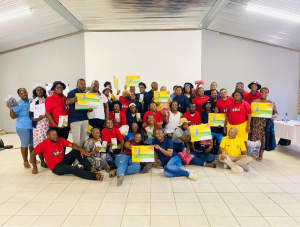The first 1,000 days of life: Campaign in Omaheke Region
WHO Namibia and the United Nations World Food Programme (WFP) launched the 1000 Days Campaign to improve nutrition of children during the period from conception to 2 years in 2022 first in the Ohangwena Region. Since then, the campaign has expanded to other regions and Omaheke was the latest region to adapt the 1000 days campaign.
The objectives of the 1000 days campaign are to:
- Capacitate Community Health Workers (CHWs), pregnant and lactating women and the public on the importance of the 1000 days.
- Promote healthy food choices through cooking demonstrations (complementary foods, healthy foods for pregnant, lactating women and the family) as a cornerstone of healthy food consumption and behaviour change communication for communities
- Demonstrate various food preservation methods
- Educate communities on nutrition (Infant and Young Child Feeding (IYCF), PMTCT, healthy eating, and basic nutrition which will also encompass teaching children using puppets and soft food toys about healthy foods and eating.
In Omaheke Region, the campaign included a three-day nutrition training of trainers from 30th of October to the 1st of November 2023, where community health workers and soup kitchen staff within Omaheke region received training on foundational aspects of nutrition including understanding undernutrition and overnutrition, micronutrient deficiency, and introduction of food groups and nutritional value, food safety, foodborne illnesses, healthy food preparation, and various food preservation methods. In addition, the training covered exclusive breastfeeding, complementary feeding, maternal nutrition, and critical nutrition action points for people living with HIV/AIDS.
As part of the comprehensive 1000 Days campaign, a hands-on cooking demonstration was conducted at Epako Clinic on the 1st of November 2023, by NUST culinary chefs, to equip pregnant and breastfeeding mothers, as well as women living with HIV/AIDS, with the essential knowledge and skills required for preparing nutritionally appropriate complementary foods and family meals tailored for different age groups to ensure that the nutrition requirements are met, and the right food is introduced at each age amongst others.
The joint implementation of the 1000 days campaign is indication that through great partnerships, a greater impact and address the need of the communities that we serve.
The 1000 Days Campaign main event was held on 2nd November 2023 at the Epako Clinic in Gobabis, Omaheke Regio under the theme “Enabling the importance of exclusive breastfeeding, better complementary feeding practices/family meals through participatory cooking demonstrations for pregnant and breastfeeding women and people living with HIV/AIDS”. It was an information sharing day, organized to disseminate key messages and insights on critical nutritional aspects relevant to the crucial window of opportunity in a child’s life - the first 1000 days.
The event also served as a platform for the trained Community Health Workers (CHWs) to impart knowledge gained during the Training of Trainers (TOT) to a wider audience. A total of 153 participants attended the campaign. Furthermore, issues pertaining to Sexual and Gender-Based Violence were sensitively discussed during a session led by the police department in collaboration with the Ministry of Gender Equality, Poverty Eradication, and Social Welfare. This crucial segment of the event shone a light on the importance of addressing these pressing challenges within the context of maternal and child health.
The event concluded with the distribution of complementary agricultural inputs to pregnant and breastfeeding mothers and people living with HIV/AIDS, symbolizing a commitment to supporting their nutritional needs and promoting self-sufficiency in food production. Information sharing hubs within Gobabis were identified that included Cuca shops and hair salons, to serve as important information centers, strategically positioned to disseminate nutrition brochures and essential materials to the community members. The joint implementation of the 1000 days campaign is another indication that through great partnerships, we can have a greater impact and address the need of the communities that we serve.
In conclusion, the 1000 Days campaign in the Omaheke Region serves as a significant stride towards achieving the United Nations' Sustainable Development Goals and addressing malnutrition in Namibia. By emphasizing the critical period from conception to a child's second birthday, the initiative, conducted in collaboration with the Ministry of Health and Social Services in collaboration with the Ministry of Gender Equality, Poverty Eradication, and Social Welfare, World Food Programme, the World Health Organization, United Nations Joint Programme on HIV/AIDS, and the Namibia University of Science and Technology (NUST), successfully educated and empowered community health workers, soup kitchen staff, and mothers on key aspects of nutrition, hygiene, and food safety.
The campaign lays a foundation for a healthier, more resilient society in alignment with global development objectives through its investment in the first 1000 days of a child's life.



